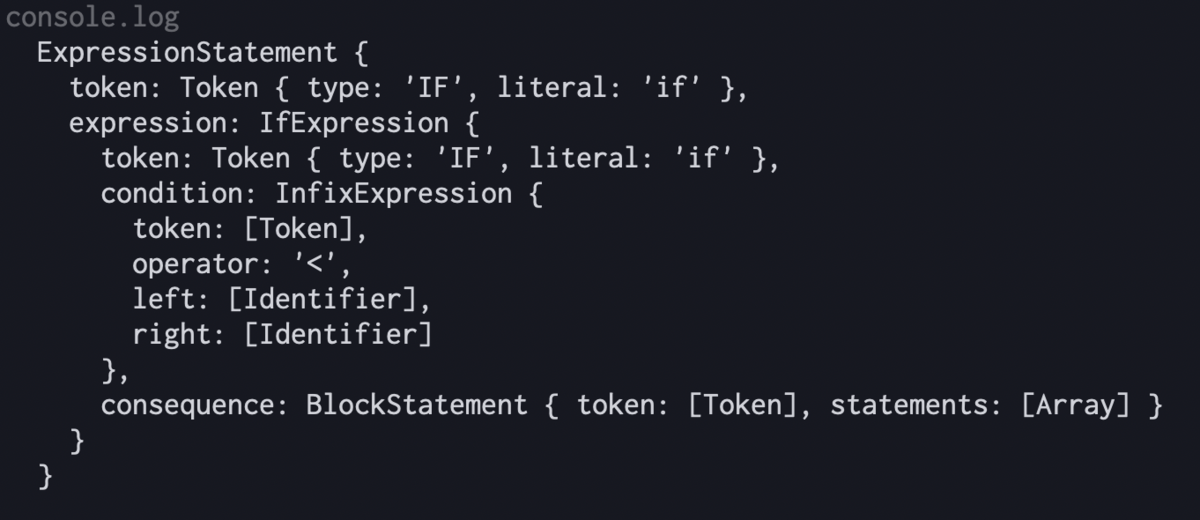『Go言語で作るインタプリタ』をTypeScriptで実装する(前編)
後編はこちら
wafuwafu13.hatenadiary.com
O'Reilly Japan - Go言語でつくるインタプリタ
を2章までTypeScriptで実装しました。
この本を手にした動機は、
- Goの文法を学習したついでに低レイヤーにも手を出したかった
- 分量的に手が出やすそうだった
TypeScriptで実装を始めた動機は、
- 2章のPratt構文解析あたりから、写経ではなく理解してないコピペで進んでいた
- デバッグしてもポインタのせいでよく分からない
- 「Go言語でつくるインタプリタ」をRustで実装しました。 - Sansan Tech Blog の影響で、このままコピペで進めていくよりも、自分の慣れている言語で実装しなおした方が理解が進む気がした
といったところです。
let文の解析を中心としてまとめていきます。
リポジトリはこちらです。
GitHub - wafuwafu13/Interpreter-made-in-TypeScript: Interpreter Written in TypeScript
環境構築
TypeScript webpack Jest ESLint Prettier を用いました。
first commit · wafuwafu13/Interpreter-made-in-TypeScript@313d7a0 · GitHub
字句解析器(レキサー)
ソースコードを入力として受け取り、出力としてそのソースコードを表現するトークン列を返します。
GoのStructをJavaScriptのclassに置き換えるとうまくいきました。
... type Lexer struct { input string position int readPosition int ch byte } func New(input string) *Lexer { l := &Lexer{input: input} l.readChar() return l } func (l *Lexer) readChar() { if l.readPosition >= len(l.input) { l.ch = 0 } else { l.ch = l.input[l.readPosition] } l.position = l.readPosition l.readPosition += 1 } ......
... export interface LexerProps { input: string; position: number; readPosition: number; ch: string | number; } export class Lexer<T extends LexerProps> { input: T['input']; position: T['position']; readPosition: T['readPosition']; ch: T['ch']; constructor( input: T['input'], position: T['position'] = 0, readPosition: T['readPosition'] = 0, ch: T['ch'] = '', ) { this.input = input; this.position = position; this.readPosition = readPosition; this.ch = ch; this.readChar(); } readChar(): void { if (this.readPosition >= this.input.length) { this.ch = 'EOF'; } else { this.ch = this.input[this.readPosition]; } this.position = this.readPosition; this.readPosition += 1; } ...
抽象構文木(AST)
ソースコードの内部表現として使われています。
GoではValueフィールドの型はExpressionですが、TypeScriptではNameフィールドと同様にIdentifierクラスの型を用いました。
... type Node interface { TokenLiteral() string String() string } type Statement interface { Node statementNode() } type Expression interface { Node expressionNode() } type Program struct { Statements []Statement } func (p *Program) TokenLiteral() string { if len(p.Statements) > 0 { return p.Statements[0].TokenLiteral() } else { return "" } } func (p *Program) String() string { var out bytes.Buffer for _, s := range p.Statements { out.WriteString(s.String()) } return out.String() } type LetStatement struct { Token token.Token Name *Identifier Value Expression } func (ls *LetStatement) statementNode() {} func (ls *LetStatement) TokenLiteral() string { return ls.Token.Literal } func (ls *LetStatement) String() string { var out bytes.Buffer out.WriteString(ls.TokenLiteral() + " ") out.WriteString(ls.Name.String()) out.WriteString(" = ") if ls.Value != nil { out.WriteString(ls.Value.String()) } out.WriteString(";") return out.String() } type Identifier struct { Token token.Token Value string } func (i *Identifier) expressionNode() {} func (i *Identifier) TokenLiteral() string { return i.Token.Literal } func (i *Identifier) String() string { return i.Value } ...
... export interface ProgramProps { statements: | LetStatement<LetStatementProps>[] | ReturnStatement<ReturnStatementProps>[] | ExpressionStatement<ExpressionStatementProps>[]; } export class Program<T extends ProgramProps> { statements: T['statements']; constructor(statements: T['statements'] = []) { this.statements = statements; } } export interface LetStatementProps { token: Token<TokenProps>; name: Identifier<IdentifierProps>; value?: Identifier<IdentifierProps>; } export class LetStatement<T extends LetStatementProps> { token: T['token']; name?: T['name']; value?: T['value']; constructor(token: T['token']) { this.token = token; } tokenLiteral(): string | number { return this.token.literal; } string(): string { let statements = []; statements.push(this.tokenLiteral() + ' '); statements.push(this.name!.string()); statements.push(' = '); if (this.value != null) { statements.push(this.value.string()); } statements.push(';'); return statements.join(''); } } export interface IdentifierProps { token: Token<TokenProps>; value: string | number; } export class Identifier<T extends IdentifierProps> { token: T['token']; value: T['value']; constructor(token: T['token'], value: T['value']) { this.token = token; this.value = value; } tokenLiteral(): string | number { return this.token.literal; } string(): string | number { return this.value; } } ...
構文解析器(パーサー)
入力データを受け取り、抽象構文木のデータ構造を構築します。
Type Guardが煩わしかったので、新たにDEFAULTトークンを定義しました。
DEFAULTトークンを定義 · wafuwafu13/Interpreter-made-in-TypeScript@42f923e · GitHub
... func (p *Parser) parseLetStatement() *ast.LetStatement { stmt := &ast.LetStatement{Token: p.curToken} if !p.expectPeek(token.IDENT) { return nil } stmt.Name = &ast.Identifier{Token: p.curToken, Value: p.curToken.Literal} if !p.expectPeek(token.ASSIGN) { return nil } p.nextToken() stmt.Value = p.parseExpression(LOWEST) if p.peekTokenIs(token.SEMICOLON) { p.nextToken() } return stmt } ...
... parseLetStatement(): LetStatement<LetStatementProps> { const stmt: LetStatement<LetStatementProps> = new LetStatement( this.curToken, ); if (!this.expectPeek(TokenDef.IDENT)) { return stmt; } stmt.name = new Identifier(this.curToken, this.curToken.literal); if (!this.expectPeek(TokenDef.ASSIGN)) { return stmt; } while (!this.curTokenIs(TokenDef.SEMICOLON)) { this.nextToken(); } return stmt; } ...
テスト
Jestを用いました。
TDDを実践できたのでよかったです。
... func TestLetStatements(t *testing.T) { tests := []struct { input string expectedIdentifier string expectedValue interface{} }{ {"let x = 5;", "x", 5}, {"let y = true;", "y", true}, {"let foobar = y;", "foobar", "y"}, } for _, tt := range tests { l := lexer.New(tt.input) p := New(l) program := p.ParseProgram() checkParserErrors(t, p) if len(program.Statements) != 1 { t.Fatalf("program.Statements does not contain 1 statements. got=%d", len(program.Statements)) } stmt := program.Statements[0] if !testLetStatement(t, stmt, tt.expectedIdentifier) { return } val := stmt.(*ast.LetStatement).Value if !testLiteralExpression(t, val, tt.expectedValue) { return } } } ...
... describe('testLetStatement', () => { const tests = [ { input: 'let x = 5;', expectedIdentifier: 'x', expectedValue: 5 }, { input: 'let y = true;', expectedIdentifier: 'y', expectedValue: true }, { input: 'let foobar = y;', expectedIdentifier: 'foobar', expectedValue: 'y', }, ]; for (const test of tests) { const l = new Lexer(test['input']); const p = new Parser(l); const program: Program<ProgramProps> = p.parseProgram(); it('checkParserErrros', () => { const errors = p.Errors(); if (errors.length != 0) { for (let i = 0; i < errors.length; i++) { console.log('parser error: %s', errors[i]); } } expect(errors.length).toBe(0); }); it('parseProgram', () => { expect(program).not.toBe(null); expect(program.statements.length).toBe(1); }); const stmt: LetStatement<LetStatementProps> | any = program.statements[0]; it('letStatement', () => { expect(stmt.token.literal).toBe('let'); expect(stmt.name.value).toBe(test['expectedIdentifier']); expect(stmt.value.value).toBe(test['expectedValue']); }); } }); ...


